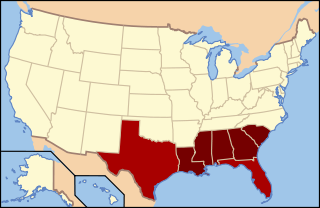
Tennessee, officially the State of Tennessee, is a landlocked state in the Southeastern region of the United States. It borders Kentucky to the north, Virginia to the northeast, North Carolina to the east, Georgia, Alabama, and Mississippi to the south, Arkansas to the southwest, and Missouri to the northwest. Tennessee is the 36th-largest by area and the 15th-most populous of the 50 states. Tennessee is geographically, culturally, and legally divided into three Grand Divisions of East, Middle, and West Tennessee. Nashville is the state's capital and largest city, and anchors its largest metropolitan area. Other major cities include Memphis, Knoxville, Chattanooga, and Clarksville. Tennessee's population as of the 2020 United States census is approximately 6.9 million.

The Southern United States is a geographic and cultural region of the United States of America. It is between the Atlantic Ocean and the Western United States, with the Midwestern and Northeastern United States to its north and the Gulf of Mexico and Mexico to its south.

Southern Airways was a regional airline in the United States, from its founding by Frank Hulse in 1949 until 1979, when it merged with North Central Airlines to become Republic Airlines. Southern's corporate headquarters were in Birmingham, with operations headquartered at Hartsfield–Jackson Atlanta International Airport, near Atlanta.

The Deep South or the Lower South is a cultural and geographic subregion of the Southern United States. The term was first used to describe the states which were most economically dependent on plantations and slavery. After the American Civil War ended in 1865, the region suffered economic hardship and was a major site of racial tension during and after the Reconstruction era. Before 1945, the Deep South was often referred to as the "Cotton States" since cotton was the primary cash crop for economic production. The civil rights movement in the 1950s and 1960s helped usher in a new era, sometimes referred to as the New South. The Deep South is part of the highly-religious, socially conservative Bible Belt and is currently a Republican Party stronghold.

Albert Arnold Gore Sr. was an American politician who served as a United States Senator from Tennessee from 1953 to 1971. A member of the Democratic Party, he previously served as a U.S. Representative from the state's 4th congressional district from 1939 to 1953. He was the father of Al Gore, who served as the 45th vice president of the United States from 1993 until 2001, and held Tennessee's other U.S. Senate seat from 1985 to 1993. A native of Granville, Tennessee, Gore graduated from Middle Tennessee State Teachers College and taught school. From 1932 to 1936 he was superintendent of schools for Smith County. He attended the Nashville Y.M.C.A. Night Law School, now the Nashville School of Law, from which he graduated in 1936.
In the United States, an interstate compact is a pact or agreement between two or more states, or between states and any foreign government. The Compact Clause of the United States Constitution provides that "No State shall, without the Consent of Congress,... enter into any Agreement or Compact with another State, or with a foreign Power,..."

Reubin O'Donovan Askew was an American politician, who served as the 37th governor of Florida from 1971 to 1979. A member of the Democratic Party, he served as the 7th U.S. Trade representative from 1979 to 1980 under President Jimmy Carter. He led on tax reform, civil rights, and financial transparency for public officials, maintaining an outstanding reputation for personal integrity.
Southern Democrats are affiliates of the U.S. Democratic Party who reside in the Southern United States.

Thomas LeRoy Collins was an American politician who served as the 33rd governor of Florida from 1955 to 1961. Collins began his governorship after winning a special election in 1954, and was elected to a four-year term in 1956.

The 1982 United States House of Representatives elections was an election for the United States House of Representatives held on November 2, 1982, to elect members to serve in the 98th United States Congress. They occurred in the middle of President Ronald Reagan's first term, whose popularity was sinking due to economic conditions under the 1982 recession. The President's Republican Party lost seats in the House, which could be viewed as a response to the President's approval at the time. Unlike most midterm election cycles, the number of seats lost—26 seats to the Democratic Party—was a comparatively large swap. It included most of the seats that had been gained the previous election, cementing the Democratic majority. Coincidentally, the number of seats the Democrats picked up (26), was the exact amount the Republicans would have needed to win the House majority. It was the first election held after the 1980 United States redistricting cycle.

The Alabama Crimson Tide football program represents the University of Alabama in the sport of American football. The team competes in the Football Bowl Subdivision (FBS) of the National Collegiate Athletic Association (NCAA) and the Western Division of the Southeastern Conference (SEC). The team is currently led by Kalen DeBoer. The Crimson Tide is among the most storied and decorated football programs in NCAA history. Since beginning play in 1892, the program claims 18 national championships, including 13 wire-service national titles in the poll-era, and five other titles before the poll-era. From 1958 to 1982, the team was led by Hall of Fame coach Paul "Bear" Bryant, who won six national titles with the program. It was not until 2009 that an Alabama player received a Heisman Trophy, when running back Mark Ingram II became the university's first winner. In 2015, Derrick Henry became the university's second Heisman winner. The Crimson Tide won back to back Heisman trophies in 2020 and 2021, with DeVonta Smith and Bryce Young.

The National Association of Secretaries of State (NASS), founded in 1904, is the oldest non-partisan professional organization of public officials in the United States, composed of the secretaries of state of U.S. states and territories. Currently, all secretaries of state, including Washington D.C., Puerto Rico, the U.S. Virgin Islands, and Guam are members of NASS.
John Eli Ivey Jr. was an American educator, a proponent of regional cooperation between colleges and universities, and was best known for innovations in the use of communications technology—specifically television—in education. He was a founder of the Southern Regional Education Board, served on the 1960 panel that recommended to John F. Kennedy the creation of the Peace Corps, and designed the University of South Florida.
Carl Michael "Mike" Smith is an American businessman, energy expert, and politician from Oklahoma. Smith is currently serving as the executive director of the Interstate Oil and Gas Compact Commission. Smith has served in numerous energy policy positions for both the United States federal and Oklahoma state governments, including Assistant Secretary of Energy for Fossil Energy under President George W. Bush (2002–2004) and Oklahoma Secretary of Energy under Governor of Oklahoma Frank Keating (1995–2002).

The Southern Regional Education Board (SREB) is a nonpartisan, nonprofit organization based in Atlanta, Georgia, that works to improve education at every level in its 16 states: Alabama, Arkansas, Delaware, Florida, Georgia, Kentucky, Louisiana, Maryland, Mississippi, North Carolina, Oklahoma, South Carolina, Tennessee, Texas, Virginia and West Virginia. The nation's first regional interstate compact for education, SREB was founded in 1948 by governors and legislators who recognized the link between education and economic vitality.
Radioactive waste is generated from the nuclear weapons program, commercial nuclear power, medical applications, and corporate and university-based research programs. Some of the materials LLW consists of are: "gloves and other protective clothing, glass and plastic laboratory supplies, machine parts and tools, and disposable medical items that have come in contact with radioactive materials". Waste is generally categorized as high level waste (HLW) and low-level waste (LLW). LLW contains materials such as irradiated tools, lab clothing, ion exchanger resins, animal carcasses, and trash from defense, commercial nuclear power, medical, and research activities. These materials usually have radioactivity that have short half lives—from ranges of multiple days to several hundred years. In 1990, 1.1 million cubic feet of LLW was produced. Currently, U.S. reactors generate about 40,000 cubic meters of low-level radioactive waste per year, including contaminated components and materials resulting from reactor decommissioning.
The Southern Governors' Association(SGA), formerly the Southern Governors Conference, was a United States association of governors founded in 1934 and dissolved in 2016. It was the oldest and historically the largest of the regional governors associations. Since its first meeting 89 years ago to discuss the repeal of discriminatory rates for transporting goods by rail, the SGA had represented the common interests of Southern chief executives and provided a vehicle for promoting them. SGA was a nonpartisan enterprise where shareholders could exchange views and access data, information and expertise on issues of general importance in order to augment the deliberations of public, private and non-profit decision-makers in the American South. SGA operated as an instrumentality of the states.
Alabama v. North Carolina, 560 U.S. 330 (2010), was an original jurisdiction United States Supreme Court case. It arose from a disagreement between the state of North Carolina and the other members of the Southeast Interstate Low-Level Radioactive Waste Management Compact over the funding for a joint project. Eight states had formed the compact in 1983 to manage low-level radioactive waste in the southeastern United States. In 1986, North Carolina was chosen as the location for the regional waste facility, and it asked the other states for funding to help with the project. The project stalled and was eventually shut down, despite North Carolina receiving $80 million from the other states. After the project's demise, the other states demanded their money back, but North Carolina refused to repay them, leading to this case.











